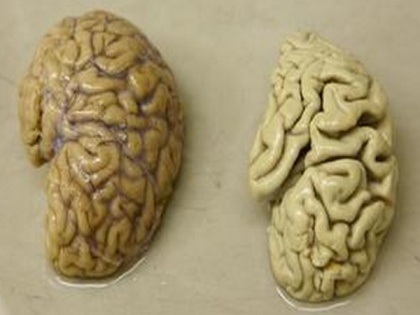Strange hyperactivation in brain can be early sign of Alzheimer's
By ANI | Published: January 22, 2021 10:09 AM2021-01-22T10:09:57+5:302021-01-22T10:20:02+5:30
A research led by psychology and neuroscience professor of the University of Montreal highlights that abnormally hyperactive areas in the brain may help better predict the onset of Alzheimer's disease.

Strange hyperactivation in brain can be early sign of Alzheimer's
A research led by psychology and neuroscience professor of the University of Montreal highlights that abnormally hyperactive areas in the brain may help better predict the onset of Alzheimer's disease.
In the study, the team led by Universite de Montreal psychology professor Sylvie Belleville, found hyperactivation in certain brain areas in people not yet diagnosed with Alzheimer's but who were worried about their memory and who exhibited risk factors for the disease.
The findings which were published in Alzheimer's & Dementia: Diagnosis, Assessment & Disease Monitoring marks an important milestone in this research area, as the hyperactivation of regions susceptible to Alzheimer's as shown by functional magnetic resonance imaging (fMRI), was observed in people with no clinical symptoms and before the onset of cognitive impairments detected with standardized tests.
"This study indicates that abnormal activation in these areas may be observed many years before diagnosis," said Belleville.
Alzheimer's disease is progressive and may emerge in the brain 20 to 30 years before diagnosis. It is therefore very important to pinpoint biomarkers -- that is, physical and detectable signs of the disease -- and to better understand the initial effects on the brain. Hyperactivation could therefore represent one of the first signs of Alzheimer's disease, according to the researchers.
The team observed that, as the disease progresses, neuronal activation follows an inverse U-shape trajectory. Indeed, activation in certain areas of the brain in the early stages of Alzheimer's may significantly increase before the neuronal loss that is caused by the disease leads to a clear decrease in inactivation.
"This form may characterize the underlying pathological process and help doctors determine the stage of the disease. When combined with other indicators such as blood work and cognitive tests, this type of neuroimaging investigation could help with possible earlier detection," explained Corriveau Lecavalier, the study's first author.
For their study, the team used data from the Consortium for the Early Identification of Alzheimer's Disease to study brain activation in groups of individuals at a high risk of developing Alzheimer's disease who had performed a memory task while being scanned with fMRI.
One group consisted of 28 individuals who were concerned about their memory but who did not show cognitive impairments on traditional clinical tests. The other group included 26 individuals with mild cognitive impairments.
The researchers found that the individuals in the first group, or those with memory complaints but who did not show objective cognitive impairments, had abnormally high levels of activation in multiple key regions of the brain affected by Alzheimer's disease.
Individuals with mild cognitive impairments, who are considered to be at a more advanced stage of the disease, tended to show decreased activation in these brain regions.
( With inputs from ANI )
Disclaimer: This post has been auto-published from an agency feed without any modifications to the text and has not been reviewed by an editor
Open in app